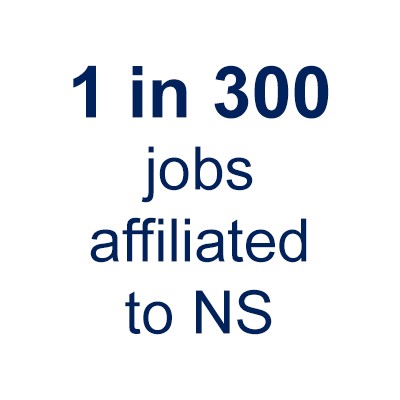As a provider of sustainable mobility, NS is committed each and every day to making Dutch society healthier and more sustainable. This year, the Dutch government will assess NS's performance over the first half of the current franchise period (2015-2024). The focus of that assessment will be on the performance of NS on the KPIs for the main rail network and the high-speed line (HSL South). The agreed targets for 2020 have been achieved, and passengers stand to benefit from that.
Operationally speaking we are clearly moving in the right direction, although there will always remain room for improvement. Due to the scale of our operations, we have an impact on the Netherlands as a whole, both in a positive and a negative sense. For years we have used our impact model to explain that impact. This year, however, we will also highlight a number of specific elements to show the various other ways in which we contribute to Dutch society and how we strive to reduce our negative impact. To that end, we will place several of our achievements of recent years in a broader (nationwide) perspective and provide more detailed insight into our contributions to Dutch society. We do so by providing a holistic view of our operations and of the mobility sector at large: how do we contribute to mobility in the Netherlands and how does this impact on the Dutch economy, on employment and on the environment?
The contribution of mobility to the Dutch knowledge economy
NS is the largest provider of mobility services in the Netherlands, with 10.7 million unique passengers every year. Given the total population of around 17.3 million, this means that approximately 62% of all people in the Netherlands use our services on a yearly basis. Between 2010 and 2017, NS's market share in overall mobility in the Netherlands increased from 9.1% to 10.1% - despite the discontinuation of several decentralised train services.
Next to its positive impact, rail travel obviously also has negative effects on society, for example in the form of delays and of passengers unable to find a seat and unable to spend their time in the way they wish. NS is working to alleviate these issues, by raising the level of comfort in both our existing and new train sets. For example, we are installing on-board charging points, upgrading Wi-Fi connections and increasing the number of seats on our trains. In this way we enable passengers to put the time they spend on our trains to good use by working, studying or relaxing. We also apply this approach to the time passengers spend in our stations, for example by opening Station Living Rooms (StationsHuiskamers).
NS transports approximately 750,000 unique passengers (on 1.3 million train journeys) every day, including approximately 280,000 commuters or business passengers and 240,000 students who take the train on a daily basis to get to their place of work or study.
Every single euro earned in the Dutch railway sector generates an additional €0.90 worldwide. On a national Dutch scale, this works out at €0.55 per euro earned in the Dutch railway sector. So, with revenues in the Netherlands of approximately €3.2 billion in 2019, NS's indirect contribution to the Dutch economy amounts roughly to €1.8 billion in additionally generated funds.


How we contribute to employment in the Netherlands
NS is one of the largest employers in the Netherlands. Every day, our 20,074 employees (17,742 FTEs) work hard to provide door-to-door journeys throughout the Netherlands, which puts NS in 11th place on the list of the largest employers in the Netherlands. NS is larger, for example, than ABN-AMRO or KPN – but smaller than PostNL or Ahold.
Each job created in the Dutch railway sector generates 0.38 jobs elsewhere in the Netherlands and 0.54 jobs globally. This means that the 20,074 jobs at NS generate an additional 7,600 jobs, or thereabouts, in the country as a whole. In other words, approximately 1 in every 300 jobs in the Netherlands is related to the activities of NS either directly or indirectly.
The added value of a railway station for the local community
The Netherlands is facing a huge housing construction challenge in the next two decades. Over the 2018-2030 period, the total population is projected to increase by around 1.3 million to 18.5 million people. In addition, housing construction does not seem to have really taken off yet. The combination of slow construction and growing demand will cause the housing shortage to rise, especially in regions already in the top 10 of traffic congestion where accessibility and liveability are under serious pressure. For this reason, we intend to move towards more efficient utilisation of the available space in station areas through densification, an approach that is already being applied in the so-called Cartesius triangle near Utrecht CS and in the Nieuwe Kern near Duivendrecht station. In collaboration with our partners, we are also examining options for using the space above the railway tracks, for example by adding office space. The first declarations of intent for construction over the tracks have already been signed, for Utrecht CS and Amsterdam Sloterdijk.
A study by CPB Netherlands Bureau for Policy Analysis has shown that the value of houses and offices in station environments is up to 25% and 18% higher, respectively, than elsewhere. Even so, local residents in these areas may of course also experience negative effects, such as noise nuisance or inconvenience caused by works at and around the station. We accept the challenge of minimising those effects as much as possible.


Our contribution to sustainability in the Netherlands
We believe that we, and our partners in the mobility sector, have a major role to play in the efforts to make the Netherlands more sustainable. That is why we have launched several initiatives and taken multiple measures in recent years to reduce our own emissions and those of our partners. For example, we initiated the 'Anders Reizen' coalition in collaboration with our partners and signed the government's Climate Agreement and the Plastic Pact.
NS is also one of the largest consumers of energy in the Netherlands. We try to reduce our energy consumption every year and make sure to obtain as much of the energy we use as possible from renewable sources. We use electricity, diesel, heat and gas for our trains, buses, stations, workshops and offices. We use 1,433 GWh of energy in total, of which 1,420 GWh is renewable energy. As such, the consumption of renewable energy by NS equalled approximately 3.2% of the total consumption of renewable energy in the Netherlands in 2018.
Electricity is the most important source of energy for NS. In total, we consume 1,346 GWh of electricity, an amount comparable with that of a city the size of Amsterdam. In order to reduce our environmental impact, we entered into a new electricity contract with Eneco in 2017 that enabled us to make all our electric trains run on 100% wind power. As a result, rail travel is now fully climate neutral. The consumption of renewable electricity by NS equalled approximately 7.5% of the total consumption of renewable electricity in the Netherlands in 2018.